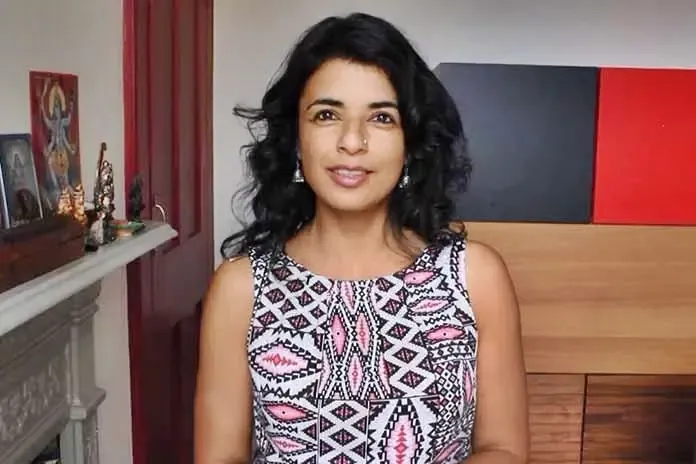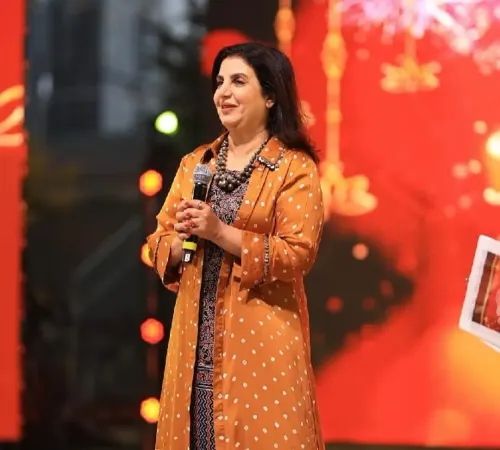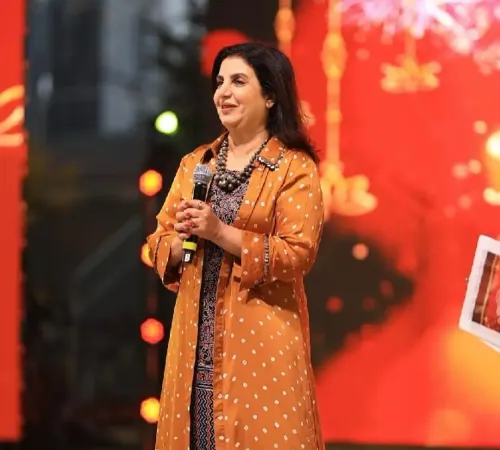Filmmaker Sandhya Suri Reflects on Violence Against Women

Synopsis
Key Takeaways
- Film Themes: Violence against women, gender dynamics, personal empowerment.
- Unique Narrative: Features a female police constable exploring her journey from housewife to police officer.
- Historical Context: Examines the remnants of colonialism in India’s police system.
- First Selection: Marks the first Hindi-language film chosen by the UK for the Academy Awards.
- Director's Background: Suri's mathematical education influences her filmmaking approach.
Mumbai, Jan 14 (NationPress) Violence, gender dynamics, and personal empowerment have long inspired writer and director Sandhya Suri in her creation of ‘Santosh’, the UK's official contender for the 2025 Academy Awards in the Best International Feature Film category.
Discussing the movie's inception, Suri shared with IANS that she had been in search of a meaningful narrative to address violence against women for an extended period.
“During my time in India, while collaborating with various NGOs, I stumbled upon a powerful image. It was during the nationwide protests ignited by the Nirbhaya gang rape case, showcasing a vast assembly of furious female demonstrators in Delhi, their faces twisted in anger, while a line of female police officers restrained them. One officer’s expression captivated me,” she recounted.
“The stark contrast between her authority and the protesting women struck me deeply; her uniform symbolized power, yet it was ironic that as a woman, she too felt unsafe in her surroundings. My research into female police constables revealed the government’s compassionate appointment scheme allowing the dependents of deceased officers to inherit their positions.”
As she connected with numerous widows, Suri observed that many had lived previously sheltered lives, often confined to their homes unless accompanied by male relatives until they began their police training.
“The transformation from housewife to widow, and ultimately to policewoman intrigued me. This was a narrative I yearned to explore both in writing and on screen,” she remarked.
The film centers around a young widow who takes over her late husband's role as a police constable in rural India and delves into a murder investigation. Notably, this marks the first occasion a Hindi-language film has been selected by the UK for this prestigious category. Despite her undergraduate background in mathematics, Suri emphasizes her desire not to analyze films as she did with English literature.
Reflecting on her experience as an English teacher in Germany, she stated, “Creating films thrilled me far more than critiquing them. Thus, I opted to attend film school as a postgraduate, leaving room for a completely new venture.”
Her mathematical education, she explains, has influenced her unique thought process, which she integrates into her filmmaking. After honing her skills in documentary filmmaking at the National Film and Television School (NFTS) in the UK, Suri began work on ‘Santosh’ in 2016.
“The script was polished following the Sundance Scriptwriters’ Lab, but the real journey involved thorough research, refining intricate details, and developing the characters. The film’s lead, Santosh, a female constable, diverges from typical portrayals in Indian cinema. She is not a diasporic character tracing her roots or an upper-middle-class protagonist fluent in English. Santosh cannot speak English. She is a constable, and I aimed to maintain that authenticity,” the director conveyed.
Recalling the moments when she learned of ‘Santosh’ being chosen for the official competition at the Cannes Film Festival and subsequently the Oscars, Suri joyfully shared, “I dropped my shopping bags, celebrated with a fist pump, and cheered. My 11-year-old daughter was so ecstatic that she forgot any sense of embarrassment.”
Looking ahead, her next project is set in a dystopian landscape. “I feel compelled to integrate all the lessons I’ve learned. It has been a steep learning process. I strive to continue speaking from the heart, ensuring the project’s essence remains as robust as it was in ‘Santosh’,” she expressed.
Documentary filmmakers have long lamented the absence of a solid distribution network and exhibition opportunities. Suri remarked, “This is a global issue. I lack a solution but wish for documentaries to be recognized for their remarkable artistry, not merely viewed as films about specific subjects. There’s immense craft and structure involved, which often goes unacknowledged.”
Despite the challenges indie filmmakers face in securing theatrical releases or being picked up for streaming services, Suri remains hopeful, asserting, “I believe in audiences. If the film is compelling and engaging, it will find its audience, regardless of labels or festival participation, provided that the distributors are bold and have faith in it,” she stated.
Anushka Shah, CEO and founder of Civic Studios, which will distribute the film in the UK and Ireland, remarked, “As a British-Indian director with immense talent, Suri has brilliantly portrayed both the issue and the narrative on screen.”
The film examines a fundamental remnant of Britain’s colonial legacy in India—its policing framework—while exploring the multifaceted pressures within and beyond the system. This, combined with its thrilling narrative that keeps audiences on the edge of their seats as it unravels a high-stakes police case, grants it universal appeal for viewers seeking engaging storytelling,” she added.








